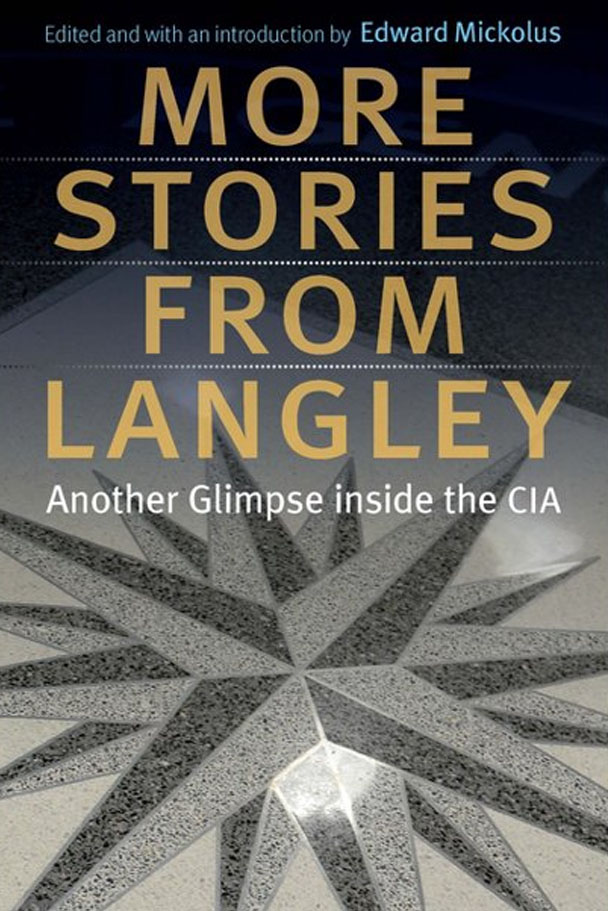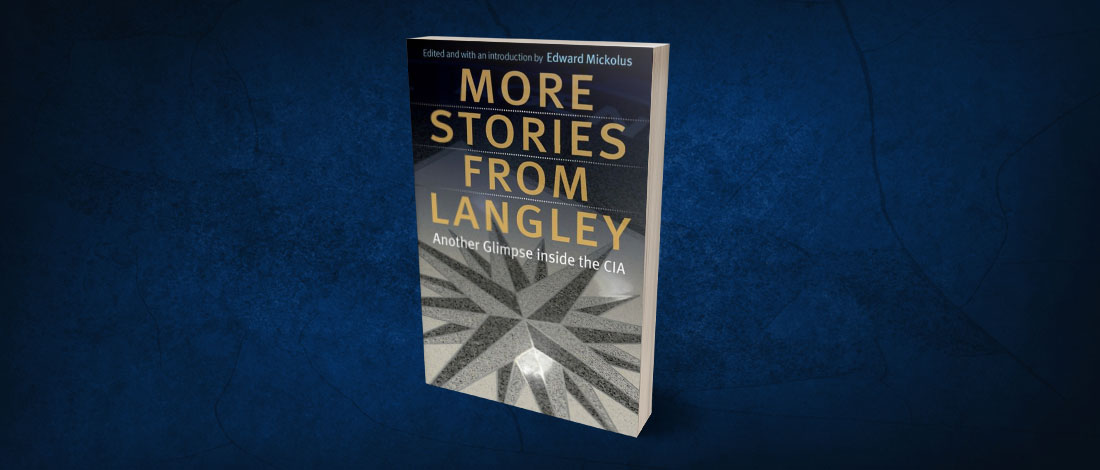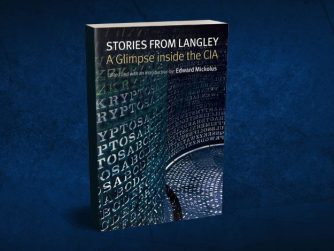Who knew the CIA needed librarians? More Stories from Langley reveals the lesser-known operations of one of the most mysterious government agencies in the United States. Edward Mickolus is back with more stories to answer the question, “What does a career in the CIA look like?”
Advice and anecdotes from both current and former CIA officers provide a look at the side of intelligence operations that is often left out of the movies. What was it like working for the CIA during 9/11? Do only spies get to travel?
More Stories from Langley has physicists getting recruited to “the agency” during the Cold War, foreign-language majors getting lucky chances, and quests to “learn by living” turning into sweaty-palmed calls to the U.S. embassy after being detained by Russian intelligence officers.
The world only needs so many suave super spies. More Stories from Langley shows how important academics, retired soldiers, and bilingual nannies can be in preserving the security of our nation.
- Title : Stories from Langley: A Glimpse Inside the CIA
- Authors : Edward Mickolus
- Publisher : Potomac Books
- Publication Date : September 1, 2020
- Language : English
- Paperback : 360 pages
- ISBN-10 : 1640123695
- ISBN-13 : 978-1640123694
- Item Weight : 14.4 ounces
- Dimensions : 7.5 x 0.9 x 8.9 inches

Table of Contents
Dedication
Introduction
The Directorate of Intelligence
Do Your Brother a Favor: Apply to CIA Elizabeth Arens
Reflections from an Analytical Change Agent: 25 Years and Counting a currently serving DI officer
What’s a Librarian Do at the CIA? Margaret Tuten
More of What a Librarian Does at the CIA Kim Condas
Getting To Do What I Was Meant To Do Robert Kresge
We’re Not in Kansas – er, Missouri – Anymore! Mary O’Sullivan
My 30 Years in Scientific and Weapons Intelligence at CIA Julian Nall
The Pathway of a Life Unnoticed Michael Douglas Smith
The DI Toolkit—Don’t Leave Home Without It Janet Stiegler
Directorate of Operations Tales
A Nightmare Come True Elinor Kelly
How Hoosier Basketball and Spying Came Together In Moscow During The Cold War Gene Arthur Coyle
How Intelligence Saved The Pope Terrence L. Williams
Flirting with the Directorate of Intelligence – A Directorate of Operations Officer’s short story Bob Phillipson
Soldier, Sailor, Artist, Spy Chip Beck
Terminating an Asset Doug Patteson
Cross-Directorate Careers
The Rocky but Interesting Road of Intelligence-Policy Relations Paul R. Pillar
Cement, Speeches, Terrorism, and Stray Cats Susan Hasler
Rock Star or CIA Officer Kathy Thomas
An Accidental Career of Consequence Jeff J. Johnson
Developing a Better Understanding of the Personal Dimensions of Working at the CIA Hector J. Escobar, III
Beginnings Lester Paldy
Directorate of Administration
My Career as a CIA Logistics Professional, 1986-2013 James R. Pasqualini
Black Programs and Services Robert M. Blansfield
Remembering Our Fallen Colleagues
The CIA Book of Honor Doug Patteson
Camp Chapman Doug Patteson
Getting Ready for the Future
Prince and the Revolution: The Re-engineering of Open Source Intelligence Collection Doug Naquin
Bell Ringers! Elinor HoughtonKelly
Ode to New CIRA Members Ed Mickolus
About the Authors
Writing Life After CIA: Books by CIA Alumni Ed Mickolus
Introduction
After the publication of Stories from Langley, the contributing authors’ families and friends inundated them with notes on how much they enjoyed having a published author/spy in their Rolodex. The most entertaining was this anecdote from contributor Hugh Pettis:
Hi Ed! I hope this tale brightens your holidays! “Stories from Langley” has made a hit in the Shenandoah Valley — as follows:
This past Monday afternoon (12/15/14) I was being prepped for an emergency esophageal procedure, lying flat on my back on the table while a surgical team bustled around the theater getting stuff ready — a young LPN equipment technician (“Ryan” by name), an RN surgical nurse, and one other RN and the anesthesiologist were setting up for the operation.. Making conversation, he asked where I had worked for the USG before embarking on my academic post-retirement life.
When I replied “CIA,” Ryan almost flew to the ceiling like an over-excited Jack Russell terrier. “Oh wow!” he exclaimed. “I am the BIGGEST CIA buff — I have almost 500 books on or about the CIA and its mission. What did you do?”
I replied (of necessity) ” I can’t tell you. BUT, a book ‘Stories from Langley’ has just been published, and it will tell you what I my work involved” (Mind you, Ed, I was half-groggy and about to go under the anesthetic.) Ryan whipped out an iPad, tapped on it, and called out to the crew “I have it right here.” A few more taps and he declared and ” and here is Hugh Pettis!” Much astonishment all around. They gathered around the table and Ryan read aloud your neat bio on me as one of the contributors to the book’s first hand accounts. The gastroenterologist came in. They took in Ryan’s reading and shared his excitement.
“When did you start with the CIA?” Ryan then asked. “Early-on, ” I managed to say: “incorporated by its OSS gang in 1949.” Someone else (the surgical nurse perhaps) offered “you must have a lot of secrets to share.”
“I do,” I replied, and turning to the anaesthesiologist who was about to pump in my Happy-Land juice, I added “Be careful. If that stuff is Sodium Pentothal [truth serum] “you all may end up in mortal danger.”
Ed — it was a great hit. I don’t think Ryan has fully recovered yet from having a veteran CIA officer in sight, on hand, and talking — one embedded in one of his 500 books about the Agency.
Just thought you’d like to know your book flies with excitement in Virginia’s Shenandoah Valley. –Hugh
Always good to know that someone’s reading your books!
This volume opens the discussion to all of the Agency’s directorates. The contributors worked in the Agency from the 1950s through the 2010s, when there were usually four Directorates—the major organizational unit within the Agency. Some had decades that spanned several decades, some became senior executives, some still served, some toiled in one or several of the Directorates. During most of that period, the Directorates were named:
- Directorate of Intelligence (housing all-source analysts, called for a few years the National Foreign Assessment Center, now called the Directorate of Analysis)
- Directorate of Science and Technology (whose scientists and engineers built tiny gadgets up through giant rockets that delivered satellite collection systems, and anything in between)
- Directorate of Administration (sometimes called Directorate of Support, sometimes divided into Mission Support groups, handling the day-to-day operation of a large organization)
- Directorate of Operations (sometimes called the National Clandestine Service, which housed those who collect intelligence, conduct counterintelligence operations, and run covert action programs)
Under then-Director John Brennan, a fifth Directorate for Digital Innovation was added to reflect a change in the operational/analytical environment facing intelligence.
This book is designed to give those considering a career in the Agency an idea of the spread of opportunities available. Watching movies or television shows and reading spy-fi novels would never lead one to think “I’m a librarian. I could work for the CIA.” Two of the memoirs in this volume are from professional librarians who made the Agency their life’s work. Two Public Affairs officers also get an opportunity to explain their contributions. Still others explain their roles as scientists, Presidential briefers, managers, trainers, targeters, innovators, accountants, auditors, and logistics wizards. Others provide insights into life serving overseas, noting some of the unexpected pressures that can turn up. One essay offers the results of numerous interviews conducted by an academic researcher on Agency culture.
More Stories is also for the reader who wonders if all of those movies, tv shows, and novels are accurate. In these pages, you will get a better flavor of what actually takes place in the halls of headquarters and in overseas postings, and how a wide range of specialties contribute to making Americans safer and help policymakers make better-informed decisions.
More Stories salutes the lives of those who gave their lives in service to their country, as evidenced by the litany of stars on the Memorial Wall on the dedication page. Virtually every Agency officer knew at least one of these brave officers. Not all of these heroes can be named; even in death, their covers must be protected to safeguard the lives of their families and their assets, some of whom still provide assistance in understanding the inner workings of their governments and organizations.
I’ve also included a bibliography of books by Agency officers; a bibliography of scholarly journal pieces, newspaper op-eds, website postings, etc., would fill hundreds of pages. The list should give the reader a guide to other stories as told by those who served.
Finally, More Stories might just inspire one or two of you to think “I wonder what I could do with my specialty?” and give a recruiter a call.







